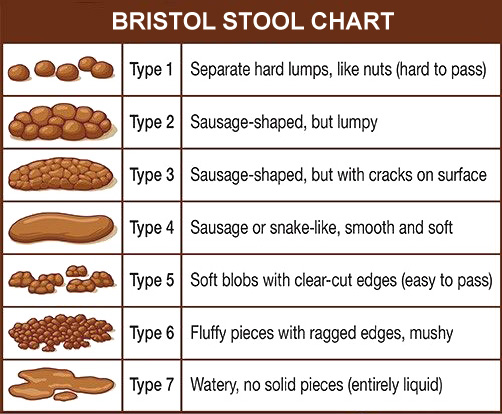How Often Should You Poop?
Are You Supposed To Poop Every Day?
▶︎ Need help pooping every day? TRY THIS ENEMA KIT

While humans do come in many shapes and sizes, we are all healthiest when we fully empty our colon each and every day. However, due to certain lifestyles and habits, many of us do not produce stool every day and are left wondering what an optimal bowel movement frequency should be.
So, how often should you have a bowel movement?
Ideally, most people should produce at least one large stool (roughly 6 to 12 inches in length) daily, although two to three times a day is often necessary to fully empty the colon.
In addition to how often you should poop, it's also important to consider what type of stool you are producing. The Bristol Stool Chart (see diagram) is a medical aid that was designed to classify human feces into seven types. Generally, if you have Type 1 or Type 2, you are constipated. If you have Type 3, your bowels aren’t being emptied enough, and you are likely dehydrated. Type 4 is ideal.
▶︎ The potential causes of constipation are numerous: hormonal issues, dietary factors, a failure to adequately hydrate, anatomical issues, side effects of medication, poisoning by heavy metals, liver or gallbladder problems, a lack of physical activity, or emotional turmoil, to name a few.
How Often Should You Poop?
Kristina Amelong, CCT, CNC addresses the question "how often should you poop?" in this short video. She discusses the different types of stools outlined on the Bristol Stool Chart, common causes of constipation, and steps you can take to improve the health of your colon and the quality of your stool, including long-term magnesium supplementation and short-term cape aloe (Aloe ferox) usage for constipation.
Natural Remedies for Constipation
Kristina Amelong, CCT, CNC discusses natural remedies for constipation that you can use from the comfort of your own home. Suggested remedies include dietary changes, colon cleansing using a 3-step enema series protocol, and taking supplements such as reacted magnesium, Endo-Met GB-3, and vitamin C.

Hormonal Imbalance and Constipation
Constipation due to a hormonal imbalance is very common in women. According to constipation research published by the National Institutes of Health, women are especially likely to experience constipation during pregnancy and during the premenopausal period due to fluctuations in hormones.
Hormonal constipation is not likely to be cured simply by following the common prescription of adding more fiber to the diet. However, increasing dietary fiber and supporting the liver with herbs, in addition to optimizing hormone levels based on the individual-specific results of a female hormone panel, can generally provide relief. To learn more about how to optimize your hormonal health, watch the video below.
Irritable Bowel Syndrome and Constipation
Irritable Bowel Syndrome (IBS) can also cause constipation. IBS is often caused by a gluten, lactose, or casein intolerance. For some, simply giving up the offending foods relieves the constipation. To determine if you have an intolerance, you can take an Adrenal Stress Index Test and/or a Gastrointestinal Health Panel offered by DiagnosTechs.

Constipation as a Side Effect of Medication
Pharmaceutical drugs also can often cause constipation. Dietary changes, exercise, optimizing hormone levels (in both women and men), and regular sleep often allows one to need fewer drugs, or even no drugs at all, which can in turn eliminate the constipation.
If you have Type 5, 6, or 7 stools, your body is likely working to get rid of a slight-to-extreme bacterial infection or other irritant, and as soon as it does, you will return to Type 4 stools. If your body doesn't adjust back to Type 4, you could be looking at an infection or a bowel disease. If you continually have a Type 5 to Type 7 bowel movement, consider a Gastrointestinal Health Panel as these types of bowel movements are not healthy.
With any type of bowel movement, enema therapy and/or colon hydrotherapy can assist your bowel back to optimal health. If you need support unraveling the cause of your constipation or still have questions, like how often should you poop, please don’t hesitate to contact the Optimal Health Network for support.
▶︎ How To Know When Constipation Is Serious
To set up an in-home colon cleanse program, we highly recommend a Silicone Flowmaster Complete Colon Cleansing Enema Kit. These kits offer the same therapeutic cleanse as a colon hydrotherapy session. This safe, inexpensive, and effective in-home system will assist you to cleanse your entire colon!
By Kristina Amelong, CCT, CNC
I-ACT-Certified Colon Hydrotherapist
Certified Nutritional Consultant
Flowmaster Complete Colon Cleanse Enema Kit
Dee Dee Delkamp, CCT, CNC and Kristina Amelong, CCT, CNC of the Optimal Health Center describe the Flowmaster Complete Colon Cleanse Enema Kit in detail.
Client Testimonial
"Kristina, I had a consultation with you recently. You did a lovely job listening to all my struggles and responding with genuine caring and compassion. The best thing is that you heard that I really didn't want to take enemas, because I hate them. Instead, you set me up with a daily suppository with coconut oil and ImmuPower. I have been constipated off and on for years. After just 7 consecutive days of suppositories, I am relieved of my constipation. Now, I just use the suppository once or twice a week to support my colon to do its job on a daily basis. This has now worked for me for a few months. I have never had this much relief for this long -- and with such a healthy and simple tool. Thank you so much, Kristina. I can't recommend these ImmuPower suppositories enough. They are easy to use and don't take any time at all." ~ Rupert